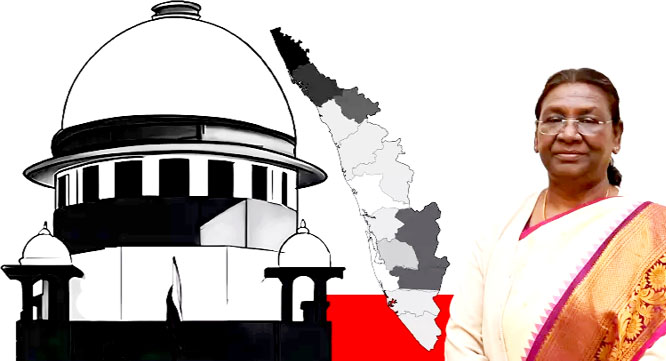NEW DELHI, Mar 23
The Kerala government has approached the Supreme Court against the President for withholding assent to four bills passed by the state legislature without giving “any reason whatsoever” and the state governor for keeping seven bills “pending for as long as two years” and then referring them to the President, terming the actions “manifestly arbitrary”.
Kerala’s ruling Left Democratic Front (LDF) government also urged the Supreme Court to declare the reference to the President “unconstitutional and lacking in good faith”.
In a writ petition filed under Article 32 of the Constitution, the state said that “the President, which would effectively mean the Council of Ministers, aiding and advising the President, has not given any reason whatsoever for withholding assent for four out of the seven Bills reserved by the Governor. This is a highly arbitrary action, violating Article 14 of the Constitution, as well as Article 200 and 201 thereof”.
“The action of the Governor in keeping the bills pending for as long as two years has subverted the functioning of the legislature of the State and rendered its existence itself ineffective and otiose. The bills include public interest bills which are for the public good, and even these have been rendered ineffective by the Governor not dealing with each one of them ‘as soon as possible’ as required by the proviso to Article 200,” the Left Democratic Front government contended.
The plea said that “the Governor has often been addressing the media and making public criticisms against the State Government and the Chief Minister, in particular, and whether the reservation for the President is as a result of this or not, to refer Bills which have been pending before the Governor for as long as 2 years to the President is a grave injustice to the post that the Governor holds and to his constitutional duties as well. One can only say that at no cost was the Governor prepared to allow the Government of Kerala and the State Legislative Assembly to function in accordance with the Constitution and the laws”.
It added that after a nudge from the Supreme Court, the governor had granted assent to one bill and referred seven others to the President, who in turn thereafter, withheld assent to four of them.
The state contended that “in making these references” to the President, “in no place does the Governor even mention the fact that he has kept the Bills pending with him for as long as 11 to 24 months”.
“If this had been mentioned, the President would have been put on enquiry, as to in not having referred the bills, ‘as soon as possible’, in accordance with the provisions of the proviso to Article 200…”.
This “shows that the bills had been kept pending without any reason whatsoever rendering the very implementation of the bills and the purpose and functioning of the legislative assembly ineffective and otiose. If the timelines were mentioned, the President would have been put to notice on why the Bills were being referred, not “as soon as possible”, but after two years”, it said.
The plea contended that the Governor’s action was a “deliberate attempt to avoid carrying out his constitutional duty and function under Article 200 of the Constitution, rendering the phrase “as soon as possible” contained in the proviso to Article 200 a dead letter, as if it does not exist”.
It prayed the Supreme Court to declare that each of the seven bills “have reverted back to the Governor, to be disposed of in accordance with the Constitution and the laws”. The bills it added, have to now be recalled, inter alia, on the ground of constitutional morality.



























